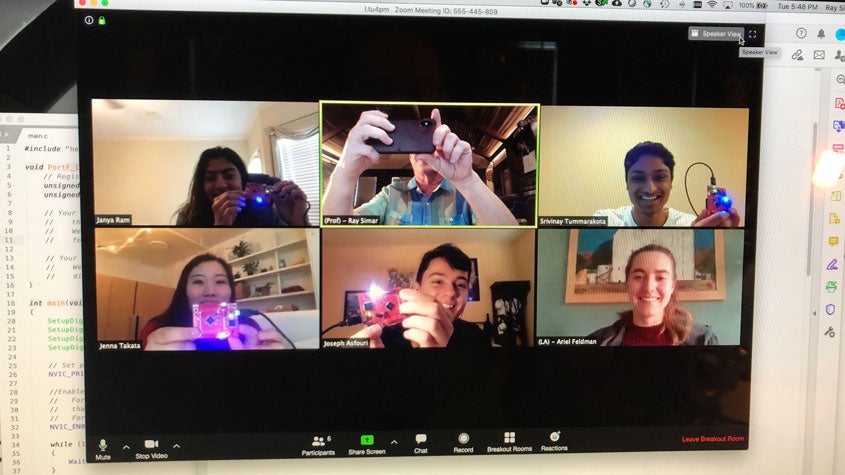Among the unsung heroes of engineering even in the best of times are lab assistants — usually upperclassmen who assist instructors and work closely with students.
So what happens when the COVID-19 pandemic scatters instructors, students and lab assistants but classes must go on? ELEC 220, “Fundamentals of Computer Engineering,” is a required course for all ECE and computer science majors at Rice, with 219 students enrolled for the spring semester.
“The lab assistants are the ones who make the labs work, and ENGI 220 is really all about the labs. When we dispersed our students to around the world, I lost 11 lab assistants, almost half of my team,” said Ray Simar, professor in the practice of electrical and computer engineering (ECE).
“Their new schedules, family commitments, time zones, and even some trepidation about being online lab assistants caused them to say they couldn’t continue in this role.”
Simar emailed former students who are now juniors and seniors. Six replied that they were willing to be “deputized,” as Simar calls it, as lab assistants. Then four of last year’s seniors, who had previously served as lab assistants but now are in industry and graduate programs, agreed to help.
Benjamin Klimko graduated last May from Rice with a B.S. in ECE and stayed on to earn his master’s degree in December. He’s now on the technical staff at the Johns Hopkins University Applied Physics Lab.
“I’m doing this,” Klimko said, “because Ray works hard on 220 to make it an engaging learning experience and I didn’t want this unusual circumstance to have an impact on so many new students’ introduction to the topic.”
Klimko doesn’t see volunteering to assist his former instructor as much of a sacrifice:
“It’s not too hard to find time to do this. The evening labs are after work hours here on the east coast and holding the labs over Zoom gives me the flexibility to join from where I am. Maryland is under a shelter-at-home order so I don’t have a lot of other activities going on at the moment.”
Brady Taylor also graduated last year from Rice and now is a doctoral student in ECE at Duke University.
“Being a lab assistant is simple,” Taylor said. “We attend meetings beforehand on Zoom to understand the lab. Then students are sent into breakout rooms and the lab assistants wait in the main session. The students can ask one of us for help. This is my 5th year in a row being a part of ELEC 220 as either a student or lab assistant, so I know the code really well and can help debug when needed. Also, these students are very smart, able to help each other more efficiently than we ever could.”
Robyn Torregroso, another 2019 ECE Rice grad, also works as an engineer in the Johns Hopkins Applied Physics Lab.
“It was important to me to make a big class feel small,” she said, “so I was all for trying to preserve this for the current students as they transitioned to online classes. Since the classes are outside of my normal working hours, I'm able to hop into the Zoom labs. I can help students troubleshoot their hardware and code and work through the logic of tackling a project.”
Simar noted that some of the substitute lab assistants are working in more than one lab session a week.
“As a result,” he said, “I have more than 15 lab assistants per online session. This is more coverage than I had during the regular semester. I went from being down in head count to having a wealth of riches. The students who stepped up are a real treasure to Rice.”

